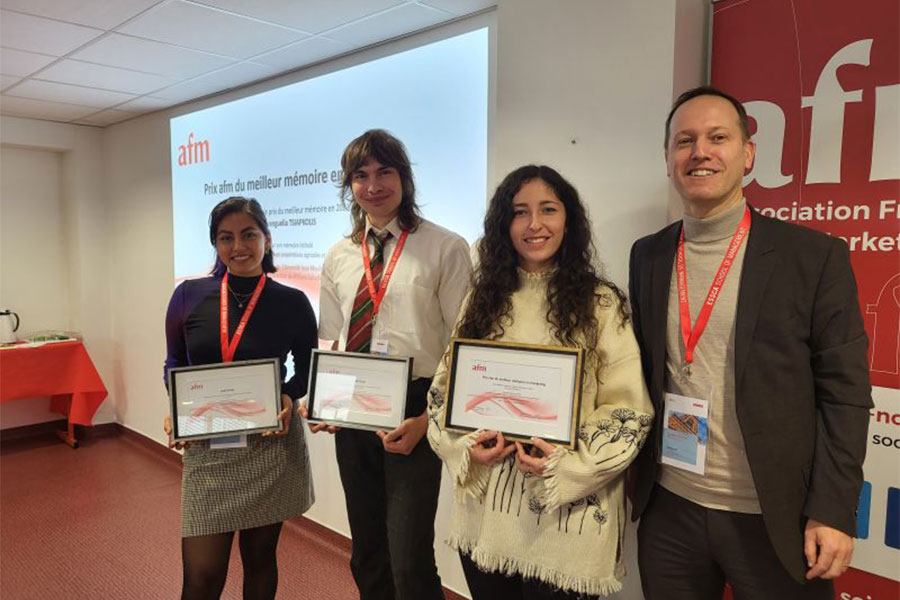iaelyon School of ManagementStudentsCurrent students
-
Partager cette page
- Courses,
- Partnerships,
- Ecology,
A student of iaelyon has been awarded “best 2023 marketing thesis” by the French Marketing Association
Published on February 26, 2024 – Updated on February 26, 2024

Evanguelia Tsiapkol, graduate student of M.Sc. in Marketing and Sales, BtoC, has been rewarded for her thesis “Sharing the value created by agricultural cooperatives and consumers”.
The thesis, supervised by SABADIE William and CAPELLI Sonia, was written in the framework of Evanguelia’s internship at the Coopération Agricole Auvergne-Rhône-Alpes.
Evanguelia Tsiapkolis is currently a Marketing PhD student at the Magellan iaelyon Research Center.
Through an initial study - survey of 691 food facings offered by agricultural cooperatives -, we are identifying the practices of agricultural cooperatives in terms of communication on their packaging, with a particular focus on highlighting the governance model and remuneration of producers. In a second study - individual semi- structured interviews and focus groups -, we interview stakeholders in the communication of cooperative remuneration (in this case, agricultural cooperative specialists and consumers) to understand how they view this communication, and what arguments they feel are most valuable to consumers.
We observe that agricultural cooperatives communicate little about their mode of governance, and provide little information when they do. Secondly, they marginally emphasize producer remuneration, and the strategies they employ are limited. Our results also confirm and extend the existing literature on agricultural cooperatives and price justice by adding on the positive image of agricultural cooperatives and their specificities among consumers. In addition, we show that consumers seem to evaluate the remuneration of cooperators via a logic of procedural justice and that they tend to evaluate the fairness of a price for the producer with the same logic as for themselves. Finally, we develop the contributions of our results for managers and legislators, by indicating the limits of our studies as well as potential avenues of research.
► More about the 2023 AFM Awards
Evanguelia Tsiapkolis is currently a Marketing PhD student at the Magellan iaelyon Research Center.
Summary of the thesis “Sharing the value created by agricultural cooperatives and consumers”.
With the enactment of the EGalim 2 law, actors in the French agri-food industry need to think about how to communicate producer remuneration to consumers. For agricultural cooperatives, which carry considerable weight in this industry, disclosing the way in which they share the value created by cooperative members can prove complicated due to their specific characteristics. Indeed, they remunerate cooperative members over a long period of time and via multiple modalities. So, in this research, we are interested in the effect of sharing the value created in agricultural cooperatives on consumer perceptions.Through an initial study - survey of 691 food facings offered by agricultural cooperatives -, we are identifying the practices of agricultural cooperatives in terms of communication on their packaging, with a particular focus on highlighting the governance model and remuneration of producers. In a second study - individual semi- structured interviews and focus groups -, we interview stakeholders in the communication of cooperative remuneration (in this case, agricultural cooperative specialists and consumers) to understand how they view this communication, and what arguments they feel are most valuable to consumers.
We observe that agricultural cooperatives communicate little about their mode of governance, and provide little information when they do. Secondly, they marginally emphasize producer remuneration, and the strategies they employ are limited. Our results also confirm and extend the existing literature on agricultural cooperatives and price justice by adding on the positive image of agricultural cooperatives and their specificities among consumers. In addition, we show that consumers seem to evaluate the remuneration of cooperators via a logic of procedural justice and that they tend to evaluate the fairness of a price for the producer with the same logic as for themselves. Finally, we develop the contributions of our results for managers and legislators, by indicating the limits of our studies as well as potential avenues of research.
► More about the 2023 AFM Awards
M.Sc. in Marketing and Sales, BtoC
Last updated: February 26, 2024

